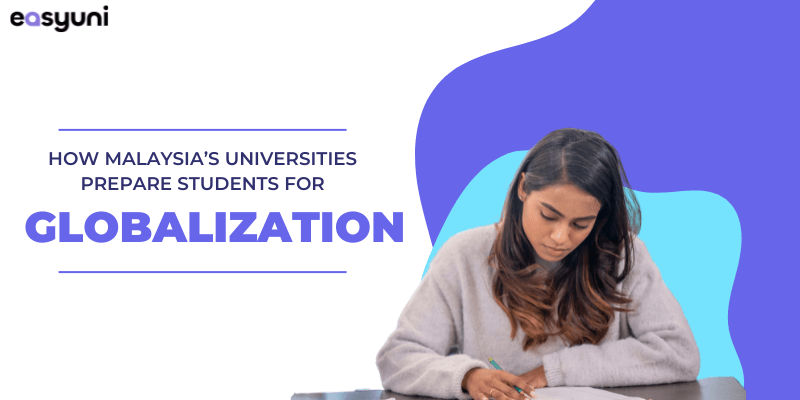Initiatives by Universities in Malaysia to Prepare Students for Globalization
April 15, 2024
Anis

As Asian education grapples with the rapid rise of online learning and the widening skills gap between graduates and industry demands, universities in Malaysia are actively responding to these challenges.
In the face of globalization, higher education institutions in Malaysia are embracing collaboration, practical skills development, and social responsibility as essential pillars of their educational philosophy.
This proactive approach reflects Malaysia's recognition of the evolving demands of a globalized world and its commitment to preparing students for success in the modern workforce.
By fostering partnerships with industry stakeholders, integrating real-world experiences into curricula, and promoting values-based education, Malaysia’s universities are equipping graduates with the skills, knowledge, and ethical framework necessary to thrive in an increasingly interconnected and competitive global environment.
How universities in Malaysia meet the demands of internationalization?
Globalization has significantly reshaped the landscape of tertiary education, impacting everything from curriculum design to student demographics.
Here are some initiatives undertaken by higher education institutions in Malaysia to meet the demands of globalized education:
1. Increased international collaborations
Universities in today's globalized world are facing increased competition as they strive to attract top students and faculty members.
This competitive atmosphere acts as a catalyst for innovation, pushing institutions to constantly improve their teaching methods and broaden their range of programs to maintain their position.
To meet these challenges, universities in Malaysia are compelled to continuously innovate and enhance their teaching methodologies and program offerings. This includes investing in modern facilities, adopting cutting-edge technologies, and developing interdisciplinary programs to meet the evolving needs of students and industries.
By staying abreast of global trends and best practices, Malaysia’s higher education institutions strive to maintain their competitive edge and attract talent from both domestic and international pools.
Moreover, globalization has prompted the universities to actively seek out collaborative opportunities with institutions abroad. International partnerships, research collaborations, and student exchange programs are increasingly prevalent, providing avenues for mutual learning and enrichment.
2. Cater curriculum for a globalized workforce
In response to the evolving demands of the global job market, Malaysian universities are undergoing significant curriculum reforms, with a primary focus on addressing the skills gap between graduates and industry requirements.
The surge of globalization has underscored the disparity between graduates' skill sets and employers' expectations. Acknowledging this discrepancy, Malaysian universities are proactively integrating practical skills development into their curricula.
These essential skills encompass areas such as data analysis, highly valued in today's globalized workforce. By embedding these practical skills within their programs, Malaysian universities aim to equip students with the competencies necessary to excel in a competitive job market.
For instance, programs such as the Bachelor of Business Analytics offered at Sunway University exemplify this focus on industry relevance.
Through courses tailored to address real-world challenges, students develop critical thinking and analytical skills essential for processing Big Data and making informed decisions.
The curriculum encompasses a comprehensive blend of Information Technology (IT) and business analytics subjects alongside a full range of core business topics, ensuring graduates possess a well-rounded skill set to thrive in the global Big Data Revolution.
3. Rise of technology and online learning

With the rise of online learning platforms, higher education in Malaysia is undergoing a transformative shift, driven by advancements in technology and a commitment to accessibility and innovation.
Accessibility lies at the forefront of this transformation, as online learning platforms break down geographical barriers, offering greater access to higher education for students dispersed across Malaysia and beyond.
Through online courses and digital resources, universities in Malaysia can reach students in remote areas or those unable to attend classroom settings due to various constraints. This democratization of education fosters inclusivity and expands opportunities for lifelong learning among diverse segments of society.
Furthermore, technology integration within classrooms is revolutionizing teaching methodologies and promoting collaboration across borders. Universities in Malaysia are increasingly adopting digital tools and interactive technologies to enhance the learning experience for students.
These innovations facilitate dynamic and engaging teaching methods, such as multimedia presentations, virtual simulations, and online discussions, that cater to diverse learning styles and preferences.
Additionally, technology-enabled collaboration platforms enable students to collaborate with peers and faculty members from different regions or even countries, fostering cross-cultural exchanges and enriching the educational experience.
4. Focus on social responsibility
Another significant impact of globalization on higher education in Malaysia is the focus on social responsibility, which is reflected in the development of programs centered on sustainability and environmental conservation.
Universities in Malaysia, such as Sunway University and Taylor's University, are actively engaging in research and initiatives aimed at mitigating the impacts of climate change and fostering sustainable practices across their institutions.
From implementing green initiatives to promoting responsible consumption and waste reduction, universities are leading by example and demonstrating their commitment to environmental and social sustainability.
In line with this commitment, these universities are not only focusing on academic research but also actively engaging in practical initiatives. They are implementing sustainability-focused curricula, integrating environmental education across disciplines, and establishing research centers dedicated to addressing environmental challenges.
Moreover, they are forging partnerships with industry, government agencies, and non-governmental organizations to amplify their impact and promote sustainable development on a broader scale.
5. Diversification of student body

A diverse student body enriches the educational experience by exposing students to different perspectives and worldviews.
International students bring unique cultural insights to the classroom, broadening Malaysian students' understanding of the world and enhancing their intercultural competence and critical thinking skills.
Moreover, the interaction between students from diverse backgrounds fosters dynamic discussions and deeper comprehension of course materials, enriching the overall learning environment.
Furthermore, studying alongside international peers prepares Malaysian students for success in a globalized world. The ability to effectively collaborate and communicate with individuals from different cultures is a crucial skill in today's interconnected workforce.
Through interactions with international students, Malaysian students gain valuable experience in navigating diverse environments, enhancing their adaptability and cross-cultural competencies.
In addition to the benefits for students, Malaysia's appeal to international students is evident. The country's higher education institutions offer quality education at a relatively affordable cost compared to many Western countries, making it an attractive destination for students seeking a valuable degree without the hefty price tag.
How do universities in Malaysia prepare students for globalization?
Universities in Malaysia play a pivotal role in preparing students for globalization by implementing various strategies and initiatives aimed at equipping them with the skills, knowledge, and mindset needed to thrive in an interconnected world.
Here are some ways in which universities in Malaysia prepare students for globalization:
1. Language proficiency
Language proficiency is a cornerstone of effective global communication, essential for fostering connections, understanding diverse perspectives, and participating in the global marketplace.
Understanding the pivotal role language plays in bridging cultural divides, universities in Malaysia prioritize language development as a fundamental aspect of their educational offerings.
With English recognized as the lingua franca of international business, academia, and diplomacy, Malaysian universities place significant emphasis on cultivating students' proficiency in this language.
Through comprehensive language programs, students are provided with structured opportunities to enhance their English language skills, encompassing listening, speaking, reading, and writing.
These language programs are thoughtfully designed to cater to students at various proficiency levels, ensuring inclusivity and accessibility for all learners. Whether through specialized courses, language immersion programs, or extracurricular activities, universities in Malaysia create immersive environments conducive to language acquisition and fluency development.
2. Internationalization initiatives
Internationalization initiatives are fundamental to Malaysia's universities' commitment to preparing students pursuing dual degrees for success in a globalized world.
Recognizing the profound impact of global exposure, these institutions proactively create opportunities for students to interact with diverse cultures, languages, and academic systems without the need to travel abroad.
Dual degree programs serve as a key component of Malaysia's internationalization efforts, allowing students to obtain qualifications from both universities in Malaysia and their international counterparts.
Through these programs, students benefit from exposure to different educational systems, pedagogical approaches, and cultural perspectives, all within the familiar environment of their home institution.
Similarly, universities in Malaysia offer opportunities for students to engage with international perspectives through virtual exchange programs and online collaboration platforms.
These initiatives enable students to interact with peers from around the world, participate in cross-cultural discussions, and collaborate on academic projects, all from the comfort of their own campus.
3. Industry engagement
Universities in Malaysia place a strong emphasis on industry engagement, forging close collaborations with various sectors to align their programs with the dynamic demands of the global workforce. By integrating industry perspectives into curriculum design and delivery, these institutions ensure that students are equipped with the practical skills and knowledge sought after by employers worldwide.
One of the primary avenues through which universities foster industry engagement is through internships. These hands-on experiences allow students to immerse themselves in professional environments, apply theoretical concepts to real-world scenarios, and develop crucial workplace skills under the mentorship of industry professionals.
By participating in internships, students not only gain practical experience but also establish valuable networks that can enhance their career prospects upon graduation.
In addition to internships, universities in Malaysia facilitate industry projects that enable students to tackle real challenges faced by businesses. Working in collaboration with industry partners, students apply their academic knowledge to solve complex problems, develop innovative solutions, and gain firsthand experience in project management and teamwork.
These industry projects not only benefit students but also provide tangible benefits to the organizations involved, fostering mutually beneficial partnerships between academia and industry.
How collaborations and international exchange programs may be beneficial to higher education in Malaysia?
The importance of collaboration and international exchange programs to globalization among universities cannot be overstated.
They serve as crucial mechanisms for fostering innovation and addressing pressing global challenges, extending their significance into higher education.
1. Building bridges of understanding
International exchange programs act as bridges of understanding, offering students and faculty invaluable opportunities to broaden their perspectives.
By immersing themselves in new cultures and academic environments, participants develop a deeper understanding of the world and diverse approaches to knowledge creation.
Additionally, these programs foster intercultural competence, equipping individuals with essential communication skills for effective collaboration across diverse backgrounds. Exposure to novel ideas within exchange programs can ignite innovation, sparking groundbreaking research collaborations between universities.
2. Research collaboration to tackle global issues
Research collaborations on an international scale leverage the collective expertise and resources of universities to tackle complex global issues. By pooling resources, institutions can address challenges such as climate change, pandemics, and sustainable development more effectively.
Collaborative research endeavors accelerate discovery, leading to breakthroughs and advancements across various scientific disciplines.
Moreover, the exchange of best practices among collaborating universities promotes knowledge sharing, fostering scientific progress and innovation on a global scale.
3. Promoting intercultural understanding
The impact of international collaboration transcends academia, influencing societies and economies worldwide.
By fostering connections and sharing best practices, universities contribute to building a more peaceful world, promoting intercultural understanding and breaking down stereotypes.
Graduates equipped with international experience and cross-cultural collaboration skills are highly sought-after in the global job market, strengthening the global workforce.
Furthermore, by combining talent and resources, universities play a pivotal role in addressing global challenges and paving the way for a more sustainable and equitable future for all.
In conclusion, as Asian education confronts the challenges posed by the rapid expansion of online learning and the widening gap between graduates' skills and industry demands, universities in Malaysia have taken proactive measures to adapt to these changing dynamics.
Recognizing the imperatives of globalization, Malaysia's higher education institutions have embraced collaboration, practical skills development, and social responsibility as fundamental tenets of their educational ethos.
Through these initiatives, Malaysia's higher education sector is not only equipping students with the skills and knowledge required for success but also contributing to the advancement of global education and the cultivation of a more sustainable and equitable future for all.
As the world continues to evolve in the face of globalization, Malaysia's universities stand poised to lead the charge in shaping the next generation of global citizens and thought leaders.
Kickstart your education in Malaysia
We'll help you find and apply for your dream university
You might be interested in...
- Raising Awareness of the Threat of Microplastics Pollution on International Mother Earth Day
- Essential Tips for International Students Studying in Malaysia's Big and Suburban Cities
- Misconceptions About Studying in Malaysia: Insights for International Students
- The Role of Education in Promoting Health Equity: Lessons from World Health Day 2024
- Studying Abroad Tips: What Should You Do Before Coming to Malaysia?
- International Students' Guide to Success in Malaysian Research Programs
- Returning Home or Staying Put: Planning Your Career Path After Studying in Malaysia
- Crafting a Greener Tomorrow: Empowering Change through Zero Waste and Upcycling Practices
- Malaysian Higher Education's Global Outreach: Collaborations with International Institutions
- Initiatives by Universities in Malaysia to Prepare Students for Globalization








